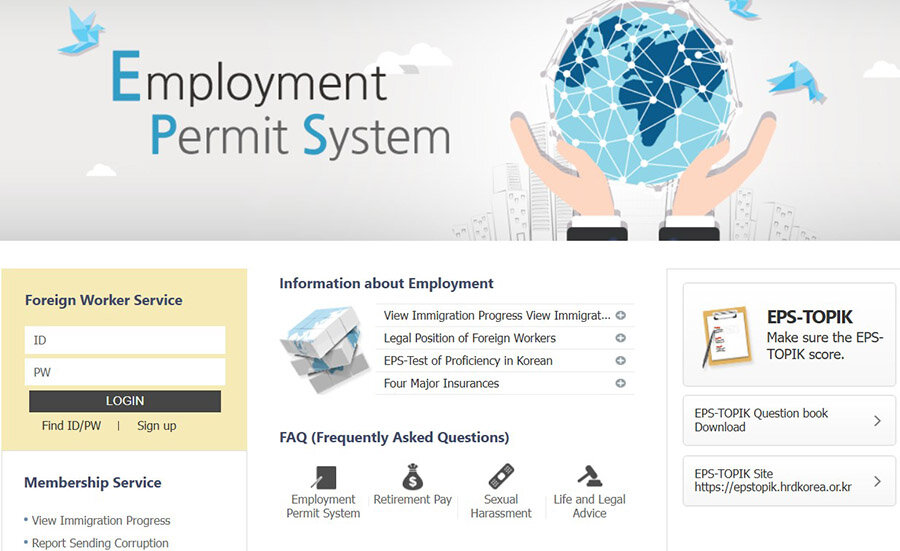Work Opportunities in South Korea: Foreigners Allowed to Take Restaurant and Logistics Jobs

As of the second half of May 2025, foreign workers residing in South Korea under the E-9 visa are officially allowed to work as restaurant servers and parcel sorters in logistics companies. These positions were previously restricted to South Korean citizens, according to The Korea Times.
The E-9 visa is a non-professional employment visa issued to nationals of 16 Asian countries, including Vietnam, Indonesia, the Philippines, Thailand, Uzbekistan, and Sri Lanka. It is granted under the Employment Permit System (EPS) for up to 4 years and 10 months. The visa is intended for jobs in sectors facing labor shortages—such as manufacturing, agriculture, construction, fishing, and services. More details are available on the official employment site.
The decision to ease restrictions was made by the Foreign Workforce Policy Committee, which oversees employment regulations for migrant workers. The reform aims to address acute staff shortages in service and logistics sectors, exacerbated by a rapidly aging population and declining birthrate.
Previously, E-9 visa holders were only permitted to work in restaurant back-of-house roles (e.g., kitchens) and in manual logistics labor (e.g., loading and unloading), not in customer-facing or sorting positions. A government spokesperson noted that, in practice, role separations are rarely followed—especially in small businesses where staff take on multiple duties. Thus, the previous restrictions were inconsistent with workplace realities and hindered efficient workflows.
Regulations were also relaxed for the hospitality sector. Previously, hotel and hostel owners could only hire E-9 workers directly or through subcontractors under exclusive individual contracts. This rule had blocked the use of cleaning agencies that serve multiple venues. That requirement has now been abolished, broadening the pool of potential employers.
For comparison, holders of H-2 (work visit) and F-4 (multi-entry visa for ethnic Koreans with foreign citizenship) visas were already permitted to work as restaurant servers and parcel sorters. However, business groups have pointed out that these workers are in short supply: manual labor remains unpopular among young South Koreans, causing chronic staffing shortages.
According to Ban Ki-soon, chairman of the committee and Minister of the Office for Government Policy Coordination, the government will continue to monitor the reform's effects and gather feedback to balance the needs of employers and local job seekers. Labor shortages have become a systemic issue in South Korea. The Korea Employment Information Service projects that the economically active population will peak in 2029 and decline thereafter. Statistics Korea reported that in 2024, the number of E-9 visa holders surpassed 300,000, with 99.7% employment. Key sectors: manufacturing and services (80.5%), agriculture and fishing (14.4%), construction (3%).
Working in South Korea continues to attract migrants, but applicants should weigh the pros and cons of life in the country. Advantages include high personal safety, modern infrastructure, and quality healthcare, notes Relife Global. Stable job conditions and a wide range of vacancies in production, logistics, and services add to the appeal. Visit World Today highlights effective governance and digital services as key benefits for migrants.
However, challenges remain. My Mandarin points to the intense work schedule and high competition. Korean work culture emphasizes long hours, and weekends often include company events. Language barriers persist, especially outside Seoul. High rent and limited social housing options add to the burden.
Meanwhile, South Korea's economic growth is slowing. According to Reuters, GDP grew only 0.1% in Q1 2025—below forecasts. Analysts cite weak domestic demand, reduced investment activity, and political instability after the impeachment of President Yoon Suk-yeol in December 2024. To support the economy, the government proposed an $8.6 billion supplementary budget to aid small businesses, boost demand, and invest in artificial intelligence.
Experts predict a further contraction in the labor force after 2029. Labor market reforms like the E-9 expansion are seen as crucial steps in maintaining service and production capacity in a shrinking economy.
Подсказки: South Korea, immigration, work visa, E-9, labor market, logistics, restaurants, foreign workers, employment reform, EPS, Korean economy, population aging








